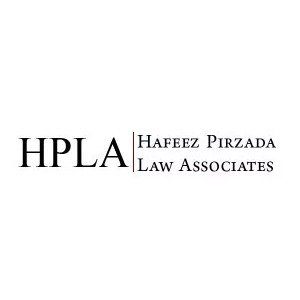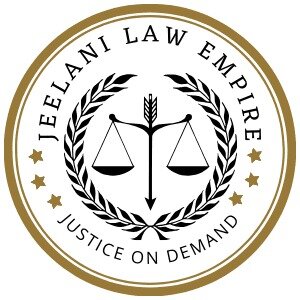Best ESG Advisory & Compliance Lawyers in Karachi
Share your needs with us, get contacted by law firms.
Free. Takes 2 min.
List of the best lawyers in Karachi, Pakistan
About ESG Advisory & Compliance Law in Karachi, Pakistan
Environmental, Social, and Governance (ESG) advisory and compliance is an emerging field in Karachi, Pakistan as businesses and organizations respond to global trends in sustainability, ethics, and regulatory requirements. ESG encompasses non-financial factors influencing a company’s business model, operations, and stakeholder engagement. In Karachi, the importance of ESG compliance is rising due to increasing regulatory expectations, investor demands, and societal pressure to demonstrate responsible business practices. Local firms and international companies operating in the city are seeking guidance to assess, implement, and report on ESG performance as part of risk management and long-term strategic planning.
Why You May Need a Lawyer
ESG advisory and compliance involves a complex interplay of local regulations, international standards, and stakeholder expectations. You may require legal advice or representation in situations such as:
- Understanding and applying new or evolving ESG-related laws in Karachi
- Developing internal ESG policies and compliance programs aligned with legal requirements
- Dealing with government agencies on environmental permits or social compliance certifications
- Managing ESG-related disclosures and reporting to investors, regulators, or the public
- Mitigating risks related to labor practices, environmental impact, or governance failures
- Responding to stakeholder concerns, community grievances, or regulatory investigations
- Ensuring supply chain compliance with ESG expectations
- Advising on Mergers and Acquisitions (M&A) due diligence from an ESG perspective
A qualified ESG lawyer can provide crucial support to navigate these areas, ensuring your business remains legally compliant and well positioned for sustainable growth.
Local Laws Overview
While ESG is still a developing legal field in Karachi, several key aspects of local and national law are highly relevant to ESG advisory and compliance:
- Environmental Law: The Pakistan Environmental Protection Act, 1997 and its associated regulations govern issues such as industrial emissions, waste management, and environmental impact assessments. Karachi’s industrial sector is specifically regulated by the Sindh Environmental Protection Agency (SEPA).
- Labor and Social Compliance: Labor rights, including workplace safety, wages, and anti-discrimination laws, are outlined under various Pakistani statues such as the Factories Act, 1934 and the Industrial Relations Act, 2012.
- Corporate Governance: Listed companies in Pakistan are required to follow the Code of Corporate Governance issued by the Securities and Exchange Commission of Pakistan (SECP), focusing on transparency, accountability, and board responsibilities.
- Reporting and Disclosure: Public companies are expected to provide certain ESG-related disclosures in their annual reports as per SECP requirements.
- International Standards: Many Karachi-based companies voluntarily adopt global ESG frameworks like the Global Reporting Initiative (GRI) or United Nations Principles for Responsible Investment (UNPRI), especially when dealing with international investors or markets.
Navigating compliance with these local laws and aligning them with global best practices can be complex, thus legal counsel is advised.
Frequently Asked Questions
What is ESG advisory and why is it important for Karachi-based businesses?
ESG advisory helps businesses identify, understand, and manage their environmental, social, and governance risks and opportunities. For Karachi companies, this offers benefits such as attracting investment, improving reputation, and meeting regulatory expectations.
Are there mandatory ESG disclosure requirements in Pakistan?
Certain companies, especially listed entities, are required by SECP to disclose some ESG-related factors in their annual reports. Specific obligations depend on the industry and regulatory status.
Who regulates ESG compliance in Karachi?
Different aspects are regulated by various bodies, including the Sindh Environmental Protection Agency for environmental matters and the Securities and Exchange Commission of Pakistan for corporate governance and disclosures.
How can a lawyer assist with ESG compliance?
A lawyer can interpret relevant laws, develop compliance strategies, draft policies, conduct due diligence, and represent your company in regulatory proceedings or disputes.
Is ESG compliance voluntary or mandatory in Karachi?
Some elements, like environmental permits, are mandatory, while broader ESG reporting may be voluntary unless you are a listed company or operate in a regulated sector.
What risks do companies face by ignoring ESG compliance?
Risks include regulatory penalties, lawsuits, reputational damage, loss of investor confidence, and restricted access to certain markets.
How are ESG risks assessed?
Lawyers and advisors typically conduct ESG risk assessments through policy reviews, stakeholder engagement, and analysis of operational practices against legal and standard benchmarks.
Can ESG compliance affect company valuation?
Yes, strong ESG performance is increasingly recognized as a factor that can positively influence company value, attract investment, and provide competitive advantage.
What are the international standards relevant for Karachi businesses?
Many companies look to frameworks like the Global Reporting Initiative (GRI), UN Sustainable Development Goals (SDGs), and ISO 14001 for guidance.
How should a company start with ESG compliance in Karachi?
Begin by consulting with a specialized lawyer or advisor, conduct a compliance gap analysis, set clear ESG goals, develop internal policies, and establish reporting systems in line with local laws and best practices.
Additional Resources
If you need more information or support on ESG advisory and compliance law in Karachi, consider the following resources:
- Sindh Environmental Protection Agency (SEPA): Oversees environmental regulation and enforcement in Karachi
- Securities and Exchange Commission of Pakistan (SECP): Responsible for corporate governance standards and disclosures
- Pakistan Environmental Protection Agency: Sets broader environmental policy nationwide
- Institute of Chartered Accountants of Pakistan (ICAP): Provides guidelines on non-financial reporting and sustainability
- Chambers of Commerce and Industry: Offer training and awareness on ESG topics
- Legal practitioners specializing in ESG advisory: Private law firms in Karachi often have practice areas dedicated to ESG, sustainability, and corporate compliance
Government agencies and professional organizations regularly organize workshops, publish guidelines, and provide updates on evolving laws and best practices.
Next Steps
If you believe ESG advisory and compliance legal assistance is necessary:
- Identify your company’s specific ESG concerns and compliance needs.
- Collect all relevant business documentation including policies, permits, and previous compliance records.
- Research and reach out to law firms or individual lawyers in Karachi with expertise in ESG or related practice areas.
- Request an initial consultation to discuss your requirements, risks, and potential solutions.
- Work with your lawyer to develop a tailored ESG compliance plan, including regular audits, staff training, and ongoing legal updates.
- Stay informed about changes in laws, regulations, and international trends that could impact your obligations or opportunities in ESG matters.
Proactive legal guidance will not only reduce legal and reputational risks but also position your business for sustainable, responsible growth within Karachi and beyond.
Lawzana helps you find the best lawyers and law firms in Karachi through a curated and pre-screened list of qualified legal professionals. Our platform offers rankings and detailed profiles of attorneys and law firms, allowing you to compare based on practice areas, including ESG Advisory & Compliance, experience, and client feedback.
Each profile includes a description of the firm's areas of practice, client reviews, team members and partners, year of establishment, spoken languages, office locations, contact information, social media presence, and any published articles or resources. Most firms on our platform speak English and are experienced in both local and international legal matters.
Get a quote from top-rated law firms in Karachi, Pakistan — quickly, securely, and without unnecessary hassle.
Disclaimer:
The information provided on this page is for general informational purposes only and does not constitute legal advice. While we strive to ensure the accuracy and relevance of the content, legal information may change over time, and interpretations of the law can vary. You should always consult with a qualified legal professional for advice specific to your situation.
We disclaim all liability for actions taken or not taken based on the content of this page. If you believe any information is incorrect or outdated, please contact us, and we will review and update it where appropriate.

















